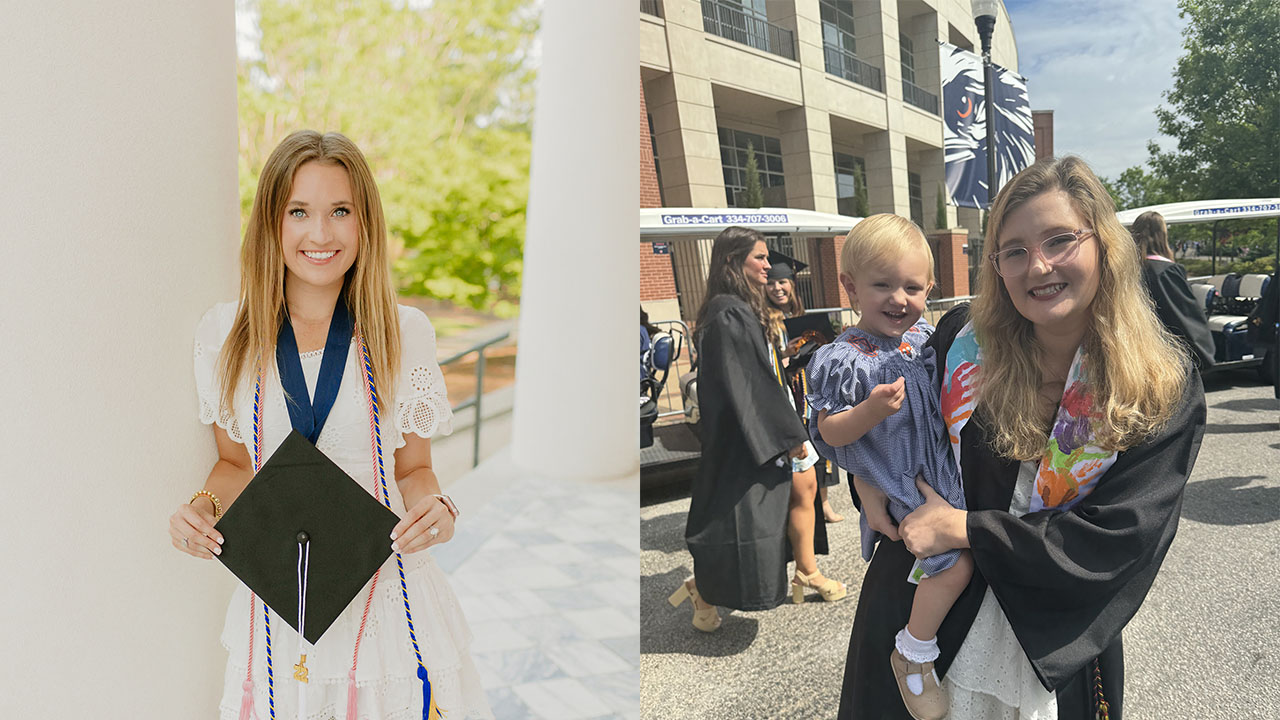content body
In spring 2020, Andi Ammons, like many first year college students, came home to Auburn when the COVID-19 pandemic hit. She withdrew from her elementary education degree program, not knowing what would come next or if she would complete her degree.
This May, Ammons completed her Bachelor of Science in Human Development and Family Science, Early Child Development offered by Auburn’s College of Human Sciences. She and classmate Emma Jones are the first two graduates of the online, asynchronous degree program. Accredited by the Commission on the Accreditation of Early Childhood Higher Education Programs of the National Association for the Education of Young Children, the in-demand degree completer program is designed to help remedy a nationwide teacher shortage and meet Alabama’s goal to serve 70% of eligible 4-year-old children with preschool programs led by accredited teachers.
“I could not have completed my degree without this program being an option,” Ammons said.
Addressing the need for early childhood educators
Jones knows first-hand the need for trained teachers in pre-K classrooms. After finishing her Bachelor of Arts in communication at Auburn, Jones started the completer degree program and worked at the Harris Early Learning Center in Birmingham as a teaching assistant.
“They offered me a full-time job as a pre-K auxiliary teacher,” said Jones, who worked full-time while completing the degree. “Pre-K is such a critical time for these children. Alabama's numbers in reading, language and literacy are just not where they should be. It's just imperative that we have professionals to help give these children a good basis going into kindergarten.”
Auburn University and the University of Alabama are the only two universities in the state that offered this particular certification in early childhood development.
“We launched our program for those assistant teachers currently in preschool classrooms so they can achieve their degrees and certifications in a way that fits their lifestyle,” said Emily Cumbie, online student success coordinator. “We know preschool teachers across the state can’t take off time and move to Auburn for the program. That’s why we deliver our curriculum fully online and asynchronous.”
Necessary flexibility
“When I learned about Auburn’s online program, I cried because I was so excited and relieved to find a program that would allow me to complete a degree in early childhood development,” said Ammons. “I needed a really flexible degree path.”
While in the program, Ammons married and had a daughter, who recently turned two. With a husband in the Navy, she moved several times and maintained continuity in her studies thanks to the structure of the program.
“A lot of our students are non-traditional, meaning they took a break or are coming from community college, and they've decided to finish their degree with Auburn,” said Cumbie. “When we launched in 2022, we had two students, and we currently have 25 students in the program. The word is spreading.”
For the students, the experience was practical for their lifestyles while not sacrificing quality of the instruction and preparation for the workforce. Both new graduates felt supported throughout the two-year program and connected to their professors and the department.
“Emily Cumbie was my advisor and she was just so wonderful,” Jones said. “She was in this with us step-by-step and always available to answer my questions or help track down the answers.”
“I argue I got a better education than a traditional in-person program,” Ammons said. “It forced me to learn how to use the online platforms, how to communicate with people and prepared me for a workforce environment where I am confident completing tasks independently and developed amazing time management skills.”
Helping Alabama children and beyond
With the support of the Alabama Department of Early Childhood Education, the online degree completer program is primed to help seasoned assistant teachers gain the bachelor’s degrees they need to move to lead teacher roles in pre-K classrooms. The program values that young children learn through play, teaching students in the program to combine curriculum goals with exploratory, play-based learning.
“Our students learn to plan a math lesson that feels like a game and language and literary lessons that are play-based,” Cumbie said. “Our graduates become teachers who teach in the way that children learn best, enabling them to target all of the Alabama early learning guidelines.”
The Bachelor of Science in Human Development and Family Science, Early Child Development is available for students around the country and prepares them to meet certification standards in their states. The degree requires 120 credit hours, of which up to 60 credits can be transferred from other institutions. The Early Child Development curriculum in the Department of Human Development and Family Science prepares students to work directly with children and families and culminates with a 12-credit hour internship placement in the final semester.
Discover if the online completer degree program is right for you.
Learn more




